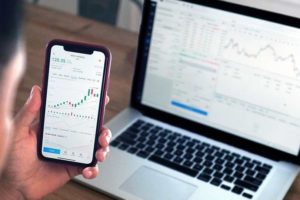Trading on the foreign exchange, or the forex, is becoming a popular way to bolster your portfolio. One of the draws of forex trading is the leverage that many brokers offer.
But what exactly does leverage bring to the table? And what are the best high leverage forex brokers in the UK? You can find out everything you need to know about high leverage forex trading in my comprehensive guide.
Also consider: Best Forex Trading Apps
Browse the top high-leverage forex brokers for September 2025
Top high leverage forex brokers at a glance
If you’re looking for a broker with a good selection of different currency pairs, then IG could be a good choice for you.
Indeed, the broker has 205 currency pairs, making it the broker with the most pairs on this list.
It could also be a good platform for beginners too, as there is no minimum deposit, and the inactivity fee is only £12 a month after two years of inactivity.
As is to be expected, the FCA-regulated broker limits leverage on forex trades to 30:1 for retail investors, though experienced traders can get leverage of up to 222:1.
To counter the low inactivity fee and a good selection of currency pairs, IG does have slightly higher trading fees. Indeed, you can expect to pay around $9.40 on trades when you use the platform.
Capital at risk.
Pepperstone is another platform that may be well suited for beginners.
The broker has no minimum deposit and no inactivity fee whatsoever, which could make the platform well suited to those who just want to try their hand at forex trading.
As the broker is regulated by the FCA in the UK, leverage is limited to 30:1 for major currency pairs, and 20:1 for minor pairs.
Meanwhile, professional forex traders can get leverage of up to 500:1 with Pepperstone’s professional account.
Trading fees are quite low on Pepperstone, though one thing you should keep in mind is the $3.50 commission on every lot traded.
Regardless, there are 62 currency pairs on offer when you use Pepperstone, which is a relatively good selection.
Spread bets and CFDs are complex instruments and come with a high risk of losing money rapidly due to leverage. 75.3% of retail investor accounts lose money when trading spread bets and CFDs with this provider. You should consider whether you understand how spread bets and CFDs work, and whether you can afford to take the high risk of losing your money.

Plus500 have a slick, intuitive web and mobile platform with an excellent range of tools to trade in various asset classes via CFDs. In terms of fees, the commission-free trading and low non-trading fees make this forex broker highly competitive.
For forex traders who conduct their trades on the move, the Plus 500 mobile app is compatible with most android devices and smartwatches. From here traders can access all the great functionality and in-depth analysis as well as execute trades and manage their trading accounts. There are also several risk management tools to help minimise losses.
Plus500 also offer a free demo account so traders can test the platform completely risk-free. There are over 60 forex pairs which can be traded as CFDs, with leverage for trading and 24/7 support.
Plus500 is a publicly-traded company that is listed on the London Stock Exchange (LON: PLUS) as well as being regulated by the Financial Conduct Authority to offer CFD trading to UK traders.
Number of forex pairs: Over 70 currency pairs
Minimum deposit: $100
Maximum amount: 1:30
CFDs are complex instruments and come with a high risk of losing money rapidly due to leverage. 80% of retail investor accounts lose money when trading CFDs with this provider. You should consider whether you understand how CFDs work and whether you can afford to take the high risk of losing your money.
Speaking of currency pairs, AvaTrade is a forex broker with slightly better offerings.
Indeed, the broker has 55 currency pairs for you to choose from. However, it’s important to keep in mind that AvaTrade is not fully regulated by the FCA in the UK.
This doesn’t mean AvaTrade is unsafe – in fact, the broker is stringently regulated by several different regulatory bodies around the world, including the Central Bank of Ireland. However, you typically won’t receive any protection from the Financial Services Compensation Scheme (FSCS) in the UK should the broker cease operations.
Despite not being fully regulated in the UK, AvaTrade still limits forex leverage to 30:1 for retail investors, though professional clients can get leverage up to 400:1 if they meet the qualification criteria.
There is a minimum deposit of $100 when you first open your account on AvaTrade, and you will be required to pay an inactivity fee of $50 a quarter after three months of inactivity, and a further fee of $100 after another 12 months.
Trading costs, which rest at $8.90, are also quite high when compared to the other brokers on this list.
CFDs are complex instruments and come with a high risk of losing money rapidly due to leverage. 76% of retail investor accounts lose money when trading CFDs with this provider. You should consider whether you understand how CFDs work and whether you can afford to take the high risk of losing your money.
How to decide which high leverage forex broker best suits you
Now that you know about some of the best high leverage forex brokers available to you, you’re probably wondering how to decide which of the trading platforms would best suit you and your trading style.
Well, this all comes down to your experience levels, appetite for risk, and your reasons for trading in the first place.
For example, if you’re still a beginner forex trader and you just want to try your hand at trading forex, you may want to consider using a broker with little to no minimum deposit requirements.
Multiple trading platforms would be suitable for you in this case, such as Pepperstone or IG.
With one of these accounts, you won’t need to commit a large sum of money before you start trading.
Meanwhile, if you have a lower tolerance for risk, you may also want to consider a broker with lower leverage.
Of course, many FCA-regulated brokers cap leverage at 30:1 for retail investors, but you may still want to stay away from offshore brokers, or any that aren’t regulated in the UK and have higher leverage, such as VantageFX.
What is forex trading?
The foreign exchange market, or “forex” as it’s more commonly known, is the global marketplace that deals with the exchanging of currencies.
When you trade on the forex, you will see that currencies are usually listed together. These are called “currency pairs”, and you typically get major currency pairs, which are the most heavily traded currencies on the forex market, and minor pairs, which are less commonly traded currencies.
For example, GBP/USD or USD/EUR are considered forex major pairs, while GBP/CAD or GBP/JPY are considered minor pairs.
Forex markets aren’t like traditional financial markets in that there isn’t a central marketplace. All forex trades are made “over the counter” (OTC) and take place electronically on computers.
As such, the forex market is open at all hours of the day, seven days a week.
How does forex trading work?
There are two main ways for investors to trade on the forex market: the spot market, and forward and future markets.
The spot market is the most common way currency traders access forex. This is where currencies are bought and sold, and when you trade on the spot market, you are essentially speculating on price movements of currencies.
The price of currencies on the spot market is dictated by a plethora of different factors, including:
- National economic performance
- Supply and demand
- Geopolitical situations
- The perception of the future performance of one currency against another.
The difference between the value of the two currencies is called the “spread”, and you may find that many forex brokers will build their trading fees into these spreads.
If you were to purchase a currency pair, and the spread between the pair increased, you could close your position and make a profit depending on how much you purchased.
Of course, if the value of the pair decreases and the spread shrinks, you could end up losing money.
Investors can also trade forex through forward and future markets. This is essentially derivative trading – you aren’t actually purchasing the underlying asset, instead placing “bets” on the movement of a currency pair.
This allows trading CFDs or making spread bets on forex futures, which is where the name of the market comes from. Though, you should keep in mind that CFDs are complex instruments, so you should do adequate research before you trade them.
Indeed, brokers are required to state how many retail investor accounts lose money when trading CFDs on their platform, a figure that is typically between 50% and 80%.
Consider taking independent investment advice if you’re unsure whether trading CFDs is suitable for you.
How is forex trading taxed in the UK?
When you trade forex in the UK, you will typically be liable to pay Capital Gains Tax (CGT) on any profits you make that fall above your CGT exempt amount. As of the 2022/23 tax year, this exemption stands at £12,300.
When you speculate on forex markets, you won’t be taxed on individual trades, but rather all at once at the end of the tax year.
It’s worth keeping in mind that HMRC considers spread betting to be gambling rather than investing, so you won’t face CGT when doing so.
What is leverage?
Leverage allows you to essentially “borrow” money from your broker to make a large trade.
These leverages are usually presented to you as a ratio – for instance, 30:1, 50:1, 200:1 – though you may see leverage presented as a percentage, commonly referred to as a margin rate.
Your broker will offer you this leverage, and you are required to make an initial payment depending on how large your trade is.
For example, say you wanted to invest £20,000 in the GBP/USD currency pair. If your broker offered you leverage of 30:1, you would be required to pay just £666 to meet the margin.
The risks of leverage
Whilst leverage can mean you’re exposed to higher potential profits, this also works conversely.
If your forex trade doesn’t go your way, your losses will also be magnified, and you could end up losing money rapidly. This is because the larger your leverage is on a position, the more of an impact small changes in prices can have on your trade.
Of course, when using an FCA-regulated broker, you will typically be given negative balance protection, which stops you from losing more money than you have in your account – you can read more about FCA restrictions in the next section.
Regardless, you can still end up taking a big hit.
FCA restrictions
While you may be keen to start trading with high leverage, it’s important to keep in mind that leverage in the UK is typically restricted to 30:1 for CFDs and CFD-like products.
This is due to the Financial Conduct Authority’s (FCA) restrictions, which made temporary rules from the European Securities and Market Authority (ESMA) permanent.
Since leverage can make trades riskier, especially for those that are still beginners, the FCA protects less experienced investors with restrictions to help prevent them from losing money on these complex financial instruments. Their restrictions require brokers to:
- Limit leverage to between 30:1 and 2:1
- Close a customer’s position when their funds fall to 50% of the margin needed to maintain their open positions
- Provide protections that guarantee a client can’t lose more than the total funds in their account (negative balance protection)
- Stop offering monetary and non-monetary enticements to encourage trading
- Provide a standardised risk warning to tell customers the percentage of their retail client accounts that lose money when trading these products with them.
These rules help to protect retail investors from losing large sums of money due to leverage.
Most forex brokers in the UK will have FCA authorisation, but that doesn’t mean all will. So, check that your broker is regulated before you start using a trading platform.
Retail investors vs professional investors
While you typically can’t obtain leverage higher than 30:1 on retail investor accounts, you can get higher leverage on professional accounts.
To get a professional trading account, you first need to prove that you’re experienced.
The rules and requirements to set up a professional account vary from broker to broker. Still, you’ll generally be required to show several years of experience trading high leverage instruments and have a certain amount of investment capital available.
On a professional trading account, you can access high leverage, sometimes as high as 5000:1, but you should note that professional trading tends to be less regulated than retail investing.
What is considered good leverage for forex trading?
There is technically no such thing as “good leverage”, as it all comes down to your experience levels and tolerance for risk.
If you’re still new to forex trading, you may want to think about using lower leverages. As you’ve seen, if trades don’t go your way and you have high leverage, you could end up losing lots, if not all, of your trading capital.
So, if you’re still unsure about forex trading, lower leverage could potentially prevent you from losing much of your money.
Best High Leverage Forex Brokers FAQs
Which forex broker has the highest leverage?
VantageFX offers the highest leverage for retail investors in the UK, with leverage of up to 500:1.
If you’re a professional investor and are looking for higher leverage, you may want to consider FXTM, which offers leverage of up to 2000:1 for professional forex traders. Read our Best Forex Brokers UK guide for a more in-depth look at forex brokers.
Is high leverage forex trading a good idea?
High leverage forex trading can sometimes be a good idea if you know what you’re doing.
High leverage brings the potential for higher gains, but if you’re still a beginner, you could lose lots of money as your losses are also magnified.
Please note
The value of your investments (and any income from them) can go down as well as up and you may not get back the full amount you invested. Past performance is not a reliable indicator of future performance. Investments should be considered over the longer term and should fit in with your overall attitude to risk and financial circumstances.
CFDs are complex instruments and more than half of retail investor accounts lose money when trading CFDs. Please make sure that you know these risks before you start trading and that you’re aware there’s a high chance of losing money rapidly on your investment.





